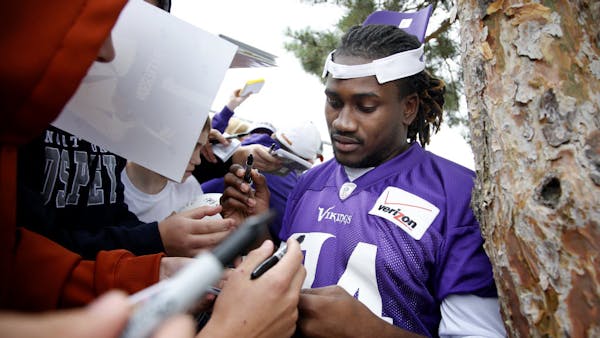The Vikings will put the pads on at training camp for the first time Monday afternoon, continuing a lengthy stay in Mankato that they hope can propel another playoff run. The linchpin for this season's success: running back Adrian Peterson, who has vowed to better the 2,000-yard MVP season he delivered a year ago. Vikings beat writer Dan Wiederer sat down this weekend for a 1-on-1 interview with Peterson. Here is Part Two of that discussion in its entirety.
Q What kind of pressure did you feel last year during rehab to get back? You wanted to be back so fast. It's a career threatening injury. It's your livelihood. What's the pressure with that?
A To be honest with you, I really didn't feel too much pressure because I knew in my mind that I set a mark, that three, four months in I was going to be able to get out and really start doing the exercises that I wanted to do that were going to really jump me to coming back and getting me back to football shape and getting this leg football ready. So in between, I really just tried to focus on doing all of the little things that [head athletic trainer] Eric Sugarman had me doing, my [rehab training] guys out in Houston at Memorial Hermann, focus on those little things and really dial in and grind and do those things to the fullest capacity to hit that first mark at three-and-a-half months, four months in, so I could take off full speed. But I really didn't put pressure on myself. I had in my mind that hey, I'm going to come back and this is what it's going to be. So with that, there wasn't pressure.
Q For what you did to the timetable of ACL recovery, is that a good thing or a bad thing for the rest of the world?
A I think it's a good thing and a bad thing. Because you have a lot of guys who just don't have that same mindset, who aren't going to work as hard as I did. So when they don't come back around the time I did or a month or two after, they're looked down upon. But on the positive side, it gives people something to shoot for. I get Tweets every day from people telling me that 'Hey, I'm going to overcome my injury or my illness. Cancer. Different diseases. I can beat it because Adrian Peterson showed me the determination and the willpower to be able to prosper and get through adversity whenever it comes.'
Q From afar, have you followed Robert Griffin III's recovery from his knee injury?
A A little bit. I've turned to ESPN, the NFL Network to kind of see how things are going for him and what not. And I wish him the best. Obviously, he's a hard worker to be able to perform the way he performs. That's something I take away from him. So if he kept that same mindset during his rehab, he'll be OK.
Q You seemed impressed with him when you guys played the Redskins last year. What was your initial impression?
A I have a good feel for people. He's a good spirited guy. You could tell. Just good spirited, man. You combine that with athletic ability and being humble, you have a special person right there. And then that ambition. You see that with how he plays. If you apply all that to rehab, he'll come back no problem.
Q The NFL changed that rule back in the spring to penalize ball carriers this season for leading with the crown of the helmet on collisions with defenders. How much thought have you given that?
A I've had it explained to me. I thought at first it was more so focused on the running backs and I didn't like that. I was like, 'Hey, if we need to keep our facemasks up, then the defensive players have to do the same thing.' I had it explained that it will go both ways. So I don't have a problem with it. I can adjust to it. It's not that big of a deal. I'm sure my helmet is still going to come down a couple of times. Hopefully it doesn't get called.
Q When they were explaining the rule at the league meetings, they showed a few of your past runs that would have been flagged. You seen those?
A Yeah. I've seen 'em. I am known for ducking my head and getting up under a guy. It's natural instinct, man. Something I've been doing since I was young. But now they want us to automatically just stop. It's going to be difficult to do that. But I'll try.
Read Part Three of the interview here.
NHL team moving from Arizona to Salt Lake City will have a name starting with Utah
Unfair labor complaint filed against Notre Dame over athletes
Kraken outlast Wild 4-3 in final regular-season game for non-playoff teams

